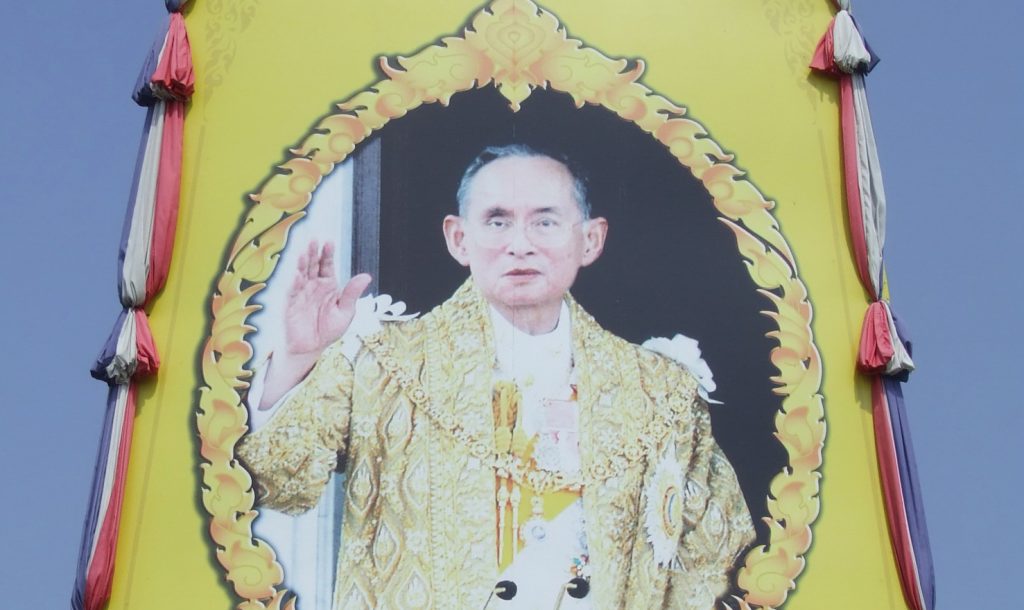There are more questions than answers as the reign of a revered monarch draws to an end. Paul Sanderson reports.
For a day, Bhumibol Adulyadej was Schrodinger’s king: both dead and not at the same time.
As Crown Prince Maha Vajiralongkorn flew back from Germany, as Prime Minister Prayuth Chan-ocha cancelled a visit to the provinces and all impending international engagements, as the 96-year-old Privy Council president and former PM Prem Tinsulanonda was escorted to the kind of meeting not held since he was a young man, the Thai public was told nothing. The King’s life is beyond saving, and everybody knows and does not know.
The word, when it came at the end of a Wednesday of rumours and rampant speculation that sent the stock market and currency into a tumble, was that he remained on life support, dialysis, antibiotics, and treatment for low blood pressure and acidosis. Many had assumed the moment had come, and that he was dead – or at the very least that he would abdicate. All the update from the Royal Household Bureau seemed to confirm was that he wouldn’t come back to life.
Thais, having been encouraged since Monday evening to wear pink to show their support, flooded social media on Wednesday and Thursday with pink images declaring their love for the king. Many gathered at the hospital, where security was tightened as the royal family gathered in the same place for the first time in years, and held vigil.
His passing will end a sad passage in Thai history. Bhumibol, 88, is truly a beloved king and he will be remembered fondly by tens of millions of people, and not just because after 70 years on the throne he has been a constant figure. As a younger man, he was a charismatic and energetic king who held the monarchy together after World War II through a combination of personality and strategic alliances with international powers and domestic hardmen. But for the past decade or more, as he battled multiple health problems, the country has been in the grip of an unspoken death watch. Unspoken too because the sweeping lese majeste laws that have been used to stifle not only criticism but even sensible discussion of the succession.
This silence has given rise to numerous conspiracy theories – that Prem and Vajiralongkorn hate each other so much they are each arranging to have the other killed, that the Crown Prince will be bypassed in favour of his sister as regent, that the king’s death would go unannounced for months or years while the military maintained its control – from barstool Kremlinologists who claim to be in the know.
The tales told about the Crown Prince, always one step removed, seem incredible but in character for a man whose former wife appeared topless at his dog’s birthday party. Lurid details aside, there is reason to worry about the impending reign of an erratic man who has exiled one former wife and their children, rusticated another and jailed her family on charges of besmirching his name, and is considered the force behind last year’s mysterious deaths in custody. And of course, there were those ‘tattoos’.
It is hard to know how serious talk of anyone but Vajiralongkorn ascending the throne is. The privy councillors, generals and conservative political figures all lined up behind him for last year’s Bike for Mom event that served its symbolic purpose. The military has been protecting its man, as well as itself. The recent army reshuffle in the wake of mandatory retirements rebalanced power to keep would-be countercoup officers happy, with the appointees guaranteeing no coups. The ducks all seem to be in a row, although what negotiation or prices are being exacted behind closed doors can only be guessed at.
A lot of thoughtful reporting has gone into examining the political consequences of Bhumibol’s death, with The Economist writing earlier this year all bets would be off politically as the stabilising force – and the military’s justification for handling the transition – would no longer keep fractured powers in check. It was not a coincidence, for example, that firebrand red shirt leader Jatuporn Prompan had his bail revoked for sarcastic comments on Tuesday as Bhumibol’s health declined; it is convenient to have him out of the way.
However, there is no immediate mood for a revolution. There will be months if not a year of mourning, economic fallout and an effort to rally around the new king. Whether this is managed well, and whether Vajiralongkorn’s excesses and temper can be kept in check, will determine if the country has an appetite for change.
But the immediate mood is one of sorrow, as an uncertain future awaits.
Paul Sanderson is pen name. The author is an independent writer and consultant based in and around Southeast Asia since 2007 who has contributed to several research projects and textbooks.
This article is a collaboration with Policy Forum — Asia and the Pacific’s premier platform for policy analysis and debate.
Editor’s note: this article was first published on 13 October as ‘Schrodinger’s king’ and has been updated to reflect the passing of King Bhumibol Adulyadej.
 Facebook
Facebook  Twitter
Twitter  Soundcloud
Soundcloud  Youtube
Youtube  Rss
Rss 